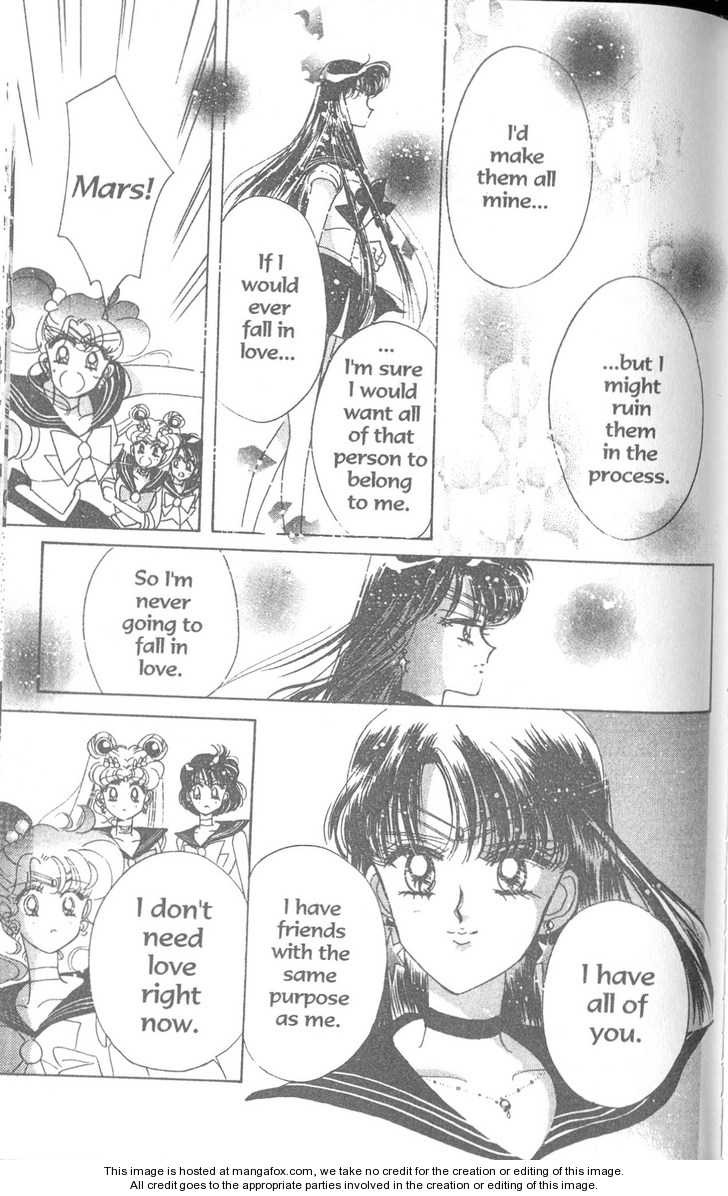
prynnette: Rei is strange. She has mysterious powers, devotes herself to “weird prayers,” and is usually seen in the company of Phobos and Deimos, her guardian crows. She is blunt, aloof, and at times a little superior. She has no interest in romance, and actively dislikes men. Above all, she maintains a steadfast refusal to apologize for any of this—the last chapter of Bishoujo Senshi Sailor Moon finds Rei just as strange and serious as the first, still devoted to her duties as a miko, still uninterested in men. A different story would have put Rei through the meat-grinder of Female Characterization in half a hundred ways: humbling her ambitions, humiliating her for her pride, pairing her with either the Nice Boy that was under her nose all along or a cocky romcom type to banter away her icy exterior. She would have been softened, stripped, and ultimately, cheapened. Instead, Rei learns to rely on her sisters-in-arms for love and support, and…is completely and utterly justified in being the strange, proud girl she dares to be. Rei doesn’t want to apologize for who she is—and neither does the story. There’s her devotion to the Hikawa Shrine. Rei’s piety never lessens over the course of the story: she is devout, she stays devout, and her plans for the future revolve around the shrine. Rei’s devotion sets her a little apart as a character—she’s connected to something solemn and old and perhaps a little forbidding. Serious, religious female characters are a rarity because, well, they’re women—they’re too frivolous, too shallow, too silly for such passion, even if they aren’t teenage girls. But Rei is never humiliated or stymied in her faith, and her friends never see her as cocky or strange because of it. Rei is serious, she is devout, and her duties do mean the world to her. The discomfort this sows in the public is noted, but not validated. She’s never the butt of a joke, never depicted as acting above her station or needing to lighten up. Rei’s beliefs are her own, and to be respected. There are her views on interpersonal relationships. Rei isn’t really big on people—a pre-senshi flashback finds her saying “I don’t have any friends. I don’t even want to make any. I can’t trust people.” Later in the chapter, she goes on to say she doesn’t want to get married, and that she isn’t interested in men. Her first assertion is recanted—she ends the flashback chapter smiling at Usagi, Ami, and Makoto, saying, “I don’t need love right now. I have friends with the same purpose as me. I have all of you.” So, yes, Rei finds that friendship—and implicitly, sisterhood—is wonderful, supportive, and complete unto itself. Note that she has not changed in personality: Rei ends the chapter as aloof, reticent, serious as she began it. The difference is, she has found friends that love her not in spite of these traits, but because of them. But let’s talk about the fact that her opposition to marriage, and men in general, remains intact. Beyond her general distaste for men, Rei knows herself enough to understand that “if I ever fell in love…I’d make them all mine, but I might ruin them in the process.” She doesn’t put her friends down for daydreaming, but she’s firm in her disinterest—it isn’t for her. If this was all I knew of Sailor Moon, I’d assume that these opinions were eroded over time, that they were emotional walls she had to learn to let down, that she went on to meet the Right Guy. But Rei never meets the Right Guy. Rei’s feelings about men, romance and marriage, are, in fact, completely and totally respected throughout the series. How often does fiction validate a woman’s sense of self—especially when that includes an opposition to romance? Rei’s understanding of herself as someone who doesn’t want to, and probably shouldn’t marry is never questioned. A teenage girl’s understanding of herself is respected and treated as insightful and correct. Rei is never painted as the frosty bitch queen who just needed to let someone in. Rei never learns an important lesson in Not All Guys Are Like That. Rei’s distaste is never laughed off as “daddy issues.” Rei’s reasons are her own, as is her happy ending: surrounded by friends, committed to the life of a senshi, and full of plans for the shrine. Without a man. And that’s okay. So, in summation: Sailor Moon celebrates Rei as someone who’s a little weird, resolutely serious, perhaps a little aloof, uninterested in men, and devoted to her faith, duty, and friends. Her most significant character change is learning to let the other senshi in, and she finds that their presence enriches her life. But they, and the story, never force her to change. So she doesn’t. She’s weird, serious, standoffish Rei to the end—and neither we the readers, nor the story itself would have it any other way. (Part five in a series on the senshi.)